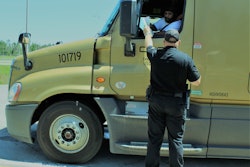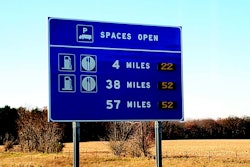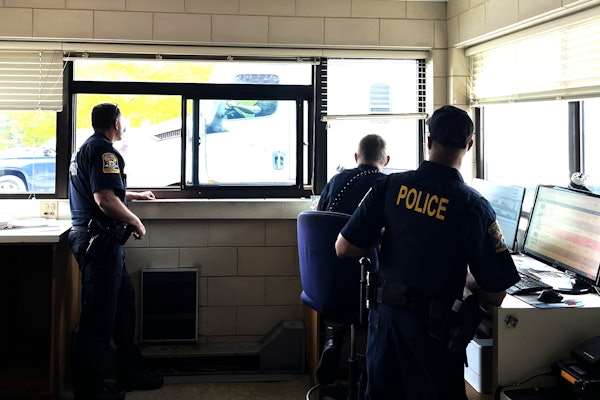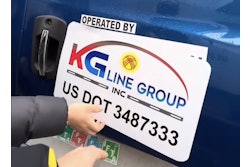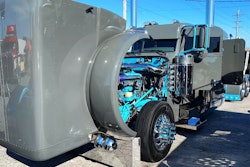Trucking news and briefs for Friday, June 7, 2024:
More data underpinning dramatic rise in cargo theft
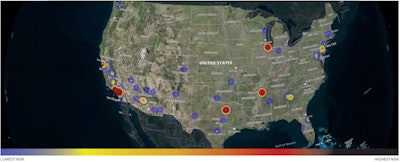 California, Texas and Tennessee were the top three states for cargo theft in the first quarter, though Arizona was among the top states for high-value thefts.Overhaul
California, Texas and Tennessee were the top three states for cargo theft in the first quarter, though Arizona was among the top states for high-value thefts.Overhaul
The trend of increasing cargo theft across the U.S. is no secret. Cargo theft recording firms have been reporting on the rise for more than a year.
One firm, Overhaul, said that as 2024 continues, the trends in cargo theft are becoming more apparent. Perhaps the biggest to watch, Overhaul noted, is a pattern involving the targeting of high-value loads, which are of special interest to criminals who have a lot to gain from a successful theft.
Every quarter, Overhaul compiles and reports data from the U.S. and abroad. During the first quarter, the company recorded 11 cargo theft events in the U.S. with a total value exceeding $1 million, a significant increase compared to Q1 of 2023, where only one event was recorded with cargo worth higher than $1 million. The value of these 11 events accounted for 49% of the total loss value in Q1-2024.
Overhaul said high-value goods such as electronics and pharmaceuticals can easily be sold on the black market for a sizable profit. Additionally, shippers often transport multiple high-value goods at once, which means the potential rewards are even greater via the theft of a single tractor-trailer. In other words, rather than risk stealing several less valuable loads, thieves often choose to go after a single, more valuable one.

[Related: Cargo theft jumped another 46% to begin 2024]
Electronics were the main high-value product type targeted during the first quarter this year, with seven events reported. The stolen products ranged from computers and monitors to specialized equipment such as cryptocurrency mining machines or telecommunications equipment. Pharmaceuticals were targeted in two events, one involving medicine and the other involving nutritional supplements.
These first-quarter theft events mainly took place in three states: California, Texas, and Arizona, well-known for commercial and logistics importance but also for cargo theft.
Overall in the first quarter, Overhaul reported 371 total cargo thefts with an average loss value of $210,597. The number of thefts recorded was a 38% increase over the same period a year ago. Full truckload theft was the most popular theft tactic by thieves during the quarter, representing 33% of all thefts. Facility theft ranked second at 27%, followed by pilferage from trailers/cargo areas at 25%.
Overhaul’s numbers are on the low end compared to another cargo theft recording firm, CargoNet, which said last month that it documented a staggering 925 theft incidents in the first quarter -- up 46% from the first quarter in 2023.
[Related: With the ongoing increase of cargo theft, experts offer mitigation insights]
CARB: California exceeds ACT sales goal 2 years ahead of schedule
The sales of new zero-emission medium- and heavy-duty trucks in California in 2023 doubled from the prior year, now representing 1 out of every 6 new vehicles sold for services that include last-mile delivery, freight transportation, and school-bus passenger transport, according to a report released by the California Air Resources Board.
With 18,473 medium- and heavy-duty ZEVs sold in California in 2023, the state has exceeded its Advanced Clean Trucks (ACT) goal two years ahead of schedule with five times the required sales numbers. Since 2021, a total of 26,921 medium- and heavy-duty ZEVs have been sold in California.
The ACT requires Class 2b-Class 8 manufacturers to sell zero-emission trucks as an increasing percentage of their annual California sales from 2024 to 2035. By 2035, zero-emission truck/chassis sales would need to be 55% of Class 2b-3 truck sales, 75% of Class 4-8 straight truck sales, and 40% of truck tractor sales.
The latest figures are a preliminary look at annual medium- and heavy-duty vehicle sales data in the state, and points to continued momentum for zero-emission vehicles, CARB noted, ahead of rules that start phasing in later this year requiring the gradual deployment of clean vehicle technology for fleets. That rule requiring fleet adoption, the Advanced Clean Fleets (ACF) rule, is effectively on hold until CARB receives a waiver from the U.S. Environmental Protection Agency.
[Related: Known unknown: How the used market will develop for Class 8 and other electric trucks]
The ACF rule in particular has been under fire from trucking industry groups and others. Most recently, a coalition of 17 states and the Nebraska Trucking Association filed a lawsuit in the U.S. District Court for the Eastern District of California that seeks to block the ACF rule. The American Free Enterprise Chamber of Commerce (AmFree Chamber) also filed suit over the rule earlier this year. Late last year, the Western States Trucking Association (WSTA) filed two lawsuits challenging both the ACT and ACF rules.
“California set visionary targets to move key transportation sectors toward zero-emissions technology, and the market is stepping up to be part of the solution for cleaner air and climate action well ahead of required targets,” said CARB Chair Liane Randolph. “The data shows that the future is zero-emissions and that fleets are finding value in making the switch early.”
In total, OEMs sold 116,483 vehicles in California, where 18,473 were ZEVs. Many of the ZEVs sold are in the medium-duty range, with Rivian (11,182 sales) and Ford (5,221 sales) leading the charge. Navistar sold 246 medium-duty ZEVs.
Among heavy-duty truck sales, Paccar led the way in 2023 with 76 ZEV tractor sales, followed by Daimler (73), BYD (68), Tesla (58) and Volvo (44). Electric terminal tractor manufacturer Orange EV sold 210 units.
[Related: States challenge latest EPA, CARB truck emissions rules]

